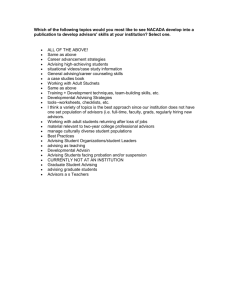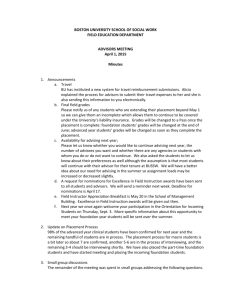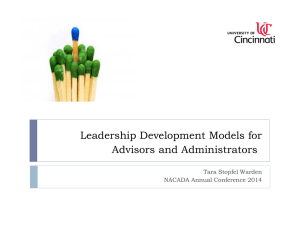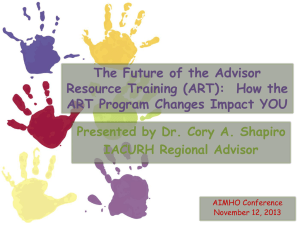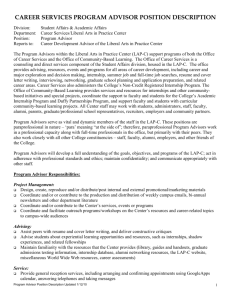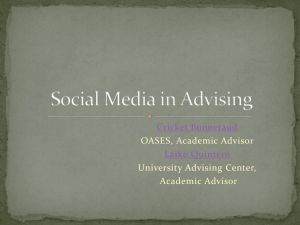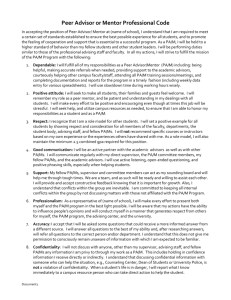NACADA Recap doc
advertisement
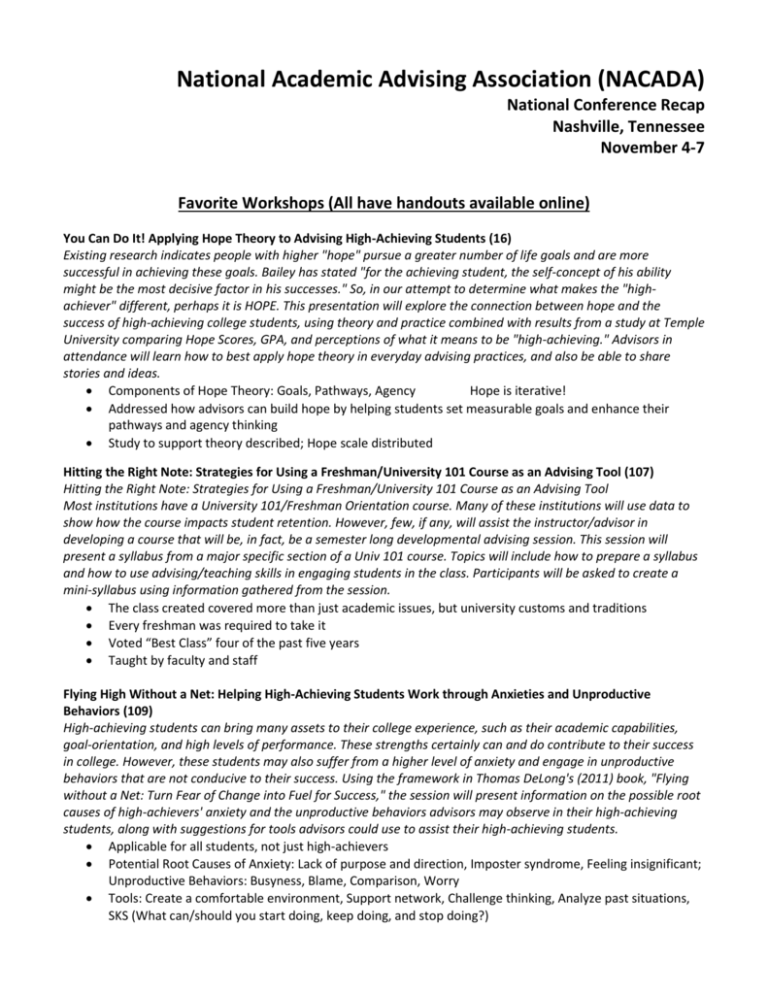
National Academic Advising Association (NACADA) National Conference Recap Nashville, Tennessee November 4-7 Favorite Workshops (All have handouts available online) You Can Do It! Applying Hope Theory to Advising High-Achieving Students (16) Existing research indicates people with higher "hope" pursue a greater number of life goals and are more successful in achieving these goals. Bailey has stated "for the achieving student, the self-concept of his ability might be the most decisive factor in his successes." So, in our attempt to determine what makes the "highachiever" different, perhaps it is HOPE. This presentation will explore the connection between hope and the success of high-achieving college students, using theory and practice combined with results from a study at Temple University comparing Hope Scores, GPA, and perceptions of what it means to be "high-achieving." Advisors in attendance will learn how to best apply hope theory in everyday advising practices, and also be able to share stories and ideas. Components of Hope Theory: Goals, Pathways, Agency Hope is iterative! Addressed how advisors can build hope by helping students set measurable goals and enhance their pathways and agency thinking Study to support theory described; Hope scale distributed Hitting the Right Note: Strategies for Using a Freshman/University 101 Course as an Advising Tool (107) Hitting the Right Note: Strategies for Using a Freshman/University 101 Course as an Advising Tool Most institutions have a University 101/Freshman Orientation course. Many of these institutions will use data to show how the course impacts student retention. However, few, if any, will assist the instructor/advisor in developing a course that will be, in fact, be a semester long developmental advising session. This session will present a syllabus from a major specific section of a Univ 101 course. Topics will include how to prepare a syllabus and how to use advising/teaching skills in engaging students in the class. Participants will be asked to create a mini-syllabus using information gathered from the session. The class created covered more than just academic issues, but university customs and traditions Every freshman was required to take it Voted “Best Class” four of the past five years Taught by faculty and staff Flying High Without a Net: Helping High-Achieving Students Work through Anxieties and Unproductive Behaviors (109) High-achieving students can bring many assets to their college experience, such as their academic capabilities, goal-orientation, and high levels of performance. These strengths certainly can and do contribute to their success in college. However, these students may also suffer from a higher level of anxiety and engage in unproductive behaviors that are not conducive to their success. Using the framework in Thomas DeLong's (2011) book, "Flying without a Net: Turn Fear of Change into Fuel for Success," the session will present information on the possible root causes of high-achievers' anxiety and the unproductive behaviors advisors may observe in their high-achieving students, along with suggestions for tools advisors could use to assist their high-achieving students. Applicable for all students, not just high-achievers Potential Root Causes of Anxiety: Lack of purpose and direction, Imposter syndrome, Feeling insignificant; Unproductive Behaviors: Busyness, Blame, Comparison, Worry Tools: Create a comfortable environment, Support network, Challenge thinking, Analyze past situations, SKS (What can/should you start doing, keep doing, and stop doing?) Dude Advise Me! Engaging Others with an Attitude of Service (135) Advisors are constantly faced with situations that require the utmost skill, tact and, diplomacy. How we choose to respond to these situations is directly linked to the choices we make regarding our attitude. An individual with a proper attitude sees and finds opportunities for success while others may not. This presentation will discuss, in a fun way, how having an attitude of service is linked with success for both advisors and students. Examples will be shared as well as a number of suggestions to help us fine-tune our attitude and create a winning situation for the student, advisor and the institution. Phenomenal speaker used personal anecdotes to reiterate the difference attitude makes in our work; addressed dilemmas and assessment Maintaining an Attitude of Service: What you do is not inherently easy; Select a student-focused attitude; Strive for constant improvement; Avoid gossip; Set an example and walk your talk; Be Accountable; Avoid complacency; Listen to your speech; Resolve conflicts immediately; Use positive language and avoid negativity; Be proactive How To Go Platinum with Your Probation Programs (158) Colleagues in the Probation/Dismissal/Retention (PDR) world know when their programs' results are a bit off key. Sometimes, it helps to hear what's working at other institutions to help a school get its PDR voice back. During our panel session, participants will learn about what has been successful and how we handled challenges at 5 different schools across the country for programs relating to PDR. Our panelists represent 2 private schools and 3 state institutions with populations ranging from 3800 to 30,000, and each panelist will present the successful and challenging aspects of her/his school's PDR program. Attendees will have the opportunity to share their respective successes and challenges, and hopefully offer and gain valuable insight to take back to their home institutions. We will take notes during the session, with the intention of sharing them with the attendees after the conference. Uses a classroom approach to helping students who are on probation Very measured and calculated expectations and outcomes Best practices from four different institutions Professional Advisor or Professional Dream Crusher? When a Student’s Goals and Expectations Collide w/ Reality (215) We've all been there: "I want to go to medical school, but I don't like science" or "I only have a 2.1 GPA, but I can get all A's the next 3 semesters to get into the nursing program." Helping these students reconcile their skills and abilities with their goals can be a challenge. How does an advisor avoid becoming a professional dream crusher? This presentation will discuss how to help students manage their expectations, explore more appropriate alternatives, and assist advisors with developing skills for helping students cope with the realization that their dream job might not be a possibility. We will also discuss how to engage additional campus resources to help students make more informed decisions about their future. Mainly focused on pre-health hopefuls Identified three categories of students: The Innocents, The Farsighted, The Last to Know and how you can assist students in each of these stages and the challenges to be prepared for Encouraging Student Self-Advocacy Skills and Connections with Faculty (241) As advisors, we empower our students to take control of their education! Seattle University Academic Advisors utilize advising appointments and learning strategy workshops to encourage student self-advocacy skills and discuss effective use of faculty office hours and advising appointments. The purpose of this conference session is to identify take-away strategies for encouraging student self-advocacy and making connections with faculty to enhance academic success; explain the process of crafting and implementing a student self-advocacy workshop; and discuss cross-cultural differences in how students of diverse backgrounds approach and view faculty and advisor interactions. Attendees will have the opportunity to dialogue with their peers and share strategies. Meet students where they are and push them further Holistic approach: the understanding that cultural lenses affect experience Learning Strategy Workshop: “taking awkward out of office hours” could be easily implemented Retaining Students in Academic Difficulty: Mason’s Academic Intervention Program (257) Retention strategies and initiatives have become an integral part of the role of academic advisors as institutions across the nation evaluate and assess ways to successfully retain students. Join presenters as they discuss one tool implemented at George Mason University to aid student retention by addressing the needs of students in academic difficulty. Presenters will explain the creation of the Academic Intervention Program utilizing Camtasia interactive videos, self-assessment tools for students, and advisor/student contracts. This presentation will focus on the overall process and outcome data from the first year of implementation and encourage participants to share tips and tools utilized on their campuses to aid in the retention of students in academic difficulty. Innovative ideas to connect to students who are in academic trouble Great use of technology GMU is an institution that is our size, so the population is relative Who’s on First? What’s My Style? (288) Ever feel like Abbott and Costello in the famous Who's on First skit when you are talking with an advisee or coworker? Sometimes even with our best efforts we may struggle with getting our message across to our advisees. In this session participants will complete an assessment to identify their communication style and explore how style impacts communication. Case studies and examples will be used to help illustrate how understanding your own communication style will help facilitate collaboration with co-workers and improve communication with advisees. Great information on how each of us communicates Fantastic tool to use when working with boss and/or subordinates, or within a team Kayti’s Poster Presentation Effectively E-Advising: Streamlining Strategies for Surviving Student Email and Maintaining Strong StudentAdvisor Connections Online (533) Do you find yourself typing the same e-mail responses day after day? Are your students forgoing physical appointments and instead emailing you for a more timely answer to their question(s)? Due in part to speed, convenience, limited advisor availability, and generational preference, many of today's college students are more likely to email their questions than schedule an appointment. Both the growing volume of student emails and decreased personal contact are forcing advisors to adapt in drastic ways. This session will demonstrate the implementation of simple ways to customize and utilize features of Microsoft Outlook for more efficient and consistent advising over email. Tips for effectively establishing and maintaining supportive student-advisor relationships via email will also be discussed. Step-by-step email instructions provided. Feel free to contact Kayti for handouts or more information Link to the workshop descriptions and available handouts: http://www.nacada.ksu.edu/conferences/proposalsphp/PresentationHandoutsList.php Region 5 Conference: April 3-5, 2013 in Kalamazoo, MI: “Advising: It’s a Zoo Out There!” http://www.nacada.ksu.edu/Regional_Divisions/region5/index.htm Concurrent Session Proposals are due January 4, 2013 Humbly submitted, Justin M. Gibson Justin.gibson@uc.edu Academic Advisor Information Technology – CECH Kayti Q. Kennard Kayti.kennard@uc.edu Assistant Director & Academic Advisor University Honors Program
